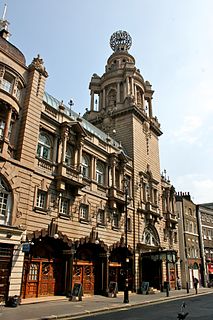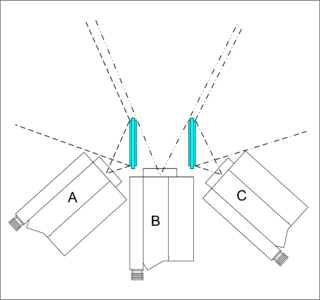
Widescreen images are images that are displayed within a set of aspect ratios used in film, television and computer screens. In film, a widescreen film is any film image with a width-to-height aspect ratio greater than the standard 1.37:1 Academy aspect ratio provided by 35 mm film.

70 mm film is a wide high-resolution film gauge for motion picture photography, with negative area nearly 3.5 times larger than the standard 35 mm motion picture film format. As used in cameras, the film is 65 mm (2.6 in) wide. For projection, the original 65 mm film is printed on 70 mm (2.8 in) film. The additional 5 mm are for four magnetic strips holding six tracks of stereophonic sound. Although later 70 mm prints use digital sound encoding, the vast majority of existing and surviving 70 mm prints predate this technology.

CinemaScope is an anamorphic lens series used, from 1953 to 1967, and less often later, for shooting widescreen movies that, crucially, could be screened in theatres using existing equipment, albeit with a lens adapter. Its creation in 1953 by Spyros P. Skouras, the president of 20th Century Fox, marked the beginning of the modern anamorphic format in both principal 2.66:1, almost twice as wide as the previously common Academy format's 1.37:1 ratio. Although the technology behind the CinemaScope lens system was made obsolete by later developments, primarily advanced by Panavision, CinemaScope's anamorphic format has continued to this day. In film-industry jargon, the shortened form, 'Scope, is still widely used by both filmmakers and projectionists, although today it generally refers to any 2.35:1, 2.39:1, 2.40:1, or 2.55:1 presentation or, sometimes, the use of anamorphic lensing or projection in general. Bausch & Lomb won a 1954 Oscar for its development of the CinemaScope lens.

Cinerama is a widescreen process that originally projected images simultaneously from three synchronized 35mm projectors onto a huge, deeply curved screen, subtending 146° of arc. The trademarked process was marketed by the Cinerama corporation. It was the first of a number of novel processes introduced during the 1950s, when the movie industry was reacting to competition from television. Cinerama was presented to the public as a theatrical event, with reserved seating and printed programs, and audience members often dressed in their best attire for the evening.

The International Film Festival Rotterdam (IFFR) is an annual film festival held at the end of January in various locations in Rotterdam, the Netherlands. Since its foundation in 1972, it has maintained a focus on independent and experimental filmmaking by showcasing emerging talents and established auteurs. The festival also places a focus on presenting cutting edge media art and arthouse film, with most of the participants in the short film program identified as artists or experimental filmmakers. IFFR also hosts CineMart and BoostNL, for film producers to seek funding.

Pacific Theatres' Cinerama Dome is a movie theater located at 6360 Sunset Boulevard in Hollywood, California. Designed to present widescreen Cinerama films, it opened November 7, 1963. Today it continues as a leading first-run theater. The original developer was William R. Forman, founder of Pacific Theatres.

The London Coliseum is a theatre in St Martin's Lane, Westminster, built as one of London's largest and most luxurious "family" variety theatres. Opened on 24 December 1904 as the London Coliseum Theatre of Varieties, it was designed by the theatrical architect Frank Matcham for the impresario Oswald Stoll. Their ambition was to build the largest and finest music hall, described as the "people's palace of entertainment" of its age.

The Prince Edward Theatre is a West End theatre situated on Old Compton Street, just north of Leicester Square, in the City of Westminster, London.

Cinemiracle was a widescreen cinema format competing with Cinerama developed in the 1950s. It was ultimately unsuccessful, with only a single film produced and released in the format. Like Cinerama it used 3 cameras to capture a 2.59:1 image. Cinemiracle used two mirrors to give the left and right cameras the same optical center as the middle camera. This made the joins between the projected images much less obvious than with Cinerama.
The Indian Hills Theater in Omaha, Nebraska, United States, was movie theater built in 1962 showcasing films in the Cinerama wide-screen format. The theater's screen was the largest of its type in the United States. Despite the protests of local citizens, Hollywood legends, and the National Trust for Historic Preservation, the theater was demolished in 2001 by Nebraska Methodist Health System for a parking lot.

The Seattle Cinerama Theatre is a landmark movie theater in Seattle, Washington, United States. Located in the city's Belltown neighborhood, it is one of only three movie theaters in the world still capable of showing three-panel Cinerama films.
Kinopanorama is a three-lens, three-film widescreen film format. Although Kinopanorama was initially known as Panorama in the Soviet Union the name was later revised to include its current name prior to the premier screenings in Moscow in 1958. In some countries, including Cuba, Greece, Norway and Sweden, it was usually marketed as Soviet Cinerama. In 1958, during which time Great Is My Country and The Enchanted Mirror, were exhibited at the Mayfair Theatre in New York City, it was briefly advertised as Cinepanorama. Kinopanorama is for the most part identical in operation to that of Fred Waller's American-designed Cinerama format.

The Peacock Theatre is a theatre in the City of Westminster, located in Portugal Street, near Aldwych. The 999-seat house is owned by, and comprises part of the London School of Economics and Political Science campus, who use the theatre for lectures, public talks, conferences, political speeches and open days.

Ilya Andreevich Khrzhanovsky is a Russian film director. He is the son of Andrei Khrzhanovsky, one of the top Russian animation directors, and Mariya Neyman, philologist, editor and script doctor. He is the grandson of artist and actor Yury Khrzhanovsky (1905—1987).

Pictureville Cinema is a cinema auditorium located within the National Science and Media Museum in Bradford, West Yorkshire, England.
Cinerama Releasing Corporation (CRC) was a motion picture company established in 1967 that originally released films produced by its namesake parent company that was considered an "instant major".
The Science Fiction Fantasy Short Film Festival (SFFSFF), is an international genre film festival devoted to fantasy and science fiction cinema from across the globe. The SFFSFF takes place annually every winter in Seattle, Washington at the world-renowned Seattle Cinerama Theater. The festival brings together industry professionals in filmmaking and the genres of science fiction and fantasy to encourage and support new, creative additions to science fiction and fantasy cinema arts. The (SFFSFF) is a co-production of the EMP Museum and SIFF.

Flying Fish is a 2011 anthology film directed by Sri Lankan filmmaker Sanjeewa Pushpakumara. It was produced with the financial support of the Hubert Bals Fund of the International Film Festival Rotterdam (IFFR). The film made its world premiere on 28 January 2011, as part of the Rotterdam festival's Tiger Awards Competition. The film has been noted for its political value, beautiful cinematography, long takes, and shocking violence.
Sanjeewa Pushpakumara born on 5 May 1977 in the Eastern Province of Sri Lanka, completed his Bachelor of Arts degree at the University of Sri Jayewardenepura in 2005. In 2008, he obtained his master's degree in Mass Communications from the University of Kelaniya. Sanjeewa, pursued a diploma in film making at the Sri Lanka National Film Corporation in 2006. In 2007, Pushpakumara received a scholarship from the Korean Culture and Tourism Ministry under its Cultural Partnership Initiative (CPI), to study film-making in the Asian Young Film Forum and also to learn Korean language at Chonbuk National University (Korea).In 2014 he obtained his advanced degree in film-making from the Chung-Ang University in South Korea as a Korean Government Scholarship Holder (KGSP). In 2009, Sanjeewa was selected to the Asian Film Academy of Busan International Film Festival.He participated in Berlin Talent Campus in 2012.

Cinerama is a cinema in central Rotterdam, the Netherlands. It started in 1960 and was rebuilt in the 1980s. It has seven screens and is owned by the Kinepolis group.














